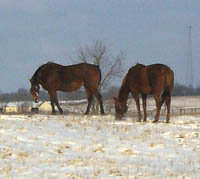UK Specialist Offers Winter Horse Care Tips
UK Specialist Offers Winter Horse Care Tips

It's wet, it's cold, and it's windy. If horse owners consider a few management details, their horses can tolerate this kind of weather.
Bob Coleman, University of Kentucky College of Agriculture equine specialist, said horse owners need to keep an eye on three things during the winter months to keep their stock in good shape: shelter, feed and water.
"In this climate, with the wind chills and more rain and freezing rain, horses are going to get wet and they better have something they can get underneath," Coleman said. "They don't need to be in the barn, but we should think about some shelter; maybe a run-in shed so they get out of the wind."
Three-walled shelters that guard against prevailing winds are best. And, in such a wet climate, a roof couldn't hurt either.
"When we have conditions where it rains and turns cold, horses are really wet and their hair coat is not doing anything for them and then the wind starts blowing. Then they're stuck with no way to get out of the wind and it dramatically chills them," he emphasized. "In addition to shelter, having a bedded area is also worth considering. Straw or wood chips are fine the idea is to have something that drains well and is dry for horses that are kept outside "
Horses are very resilient and tolerant to the cold. They can withstand temperature down to 13 degrees Fahrenheit. Anything below that is cause for horse owner to think about their feeding program. Horses will need more energy to keep themselves warm.
Coleman said the best advice is to listen to the local forecast and take necessary action.
"We are very fortunate to have good communications available to us," he said. "If they tell you it's going down to 10 degrees, you need to think about adding more feed. You're probably looking at adding a half-pound of hay for every degree below 13 F. If you're feeding roll-bale hay, just make sure it's adequate and good quality."
If you know your hay isn't very good, it's a good idea to add grain to the ration, especially if the horses body condition is below a five or a six. But, Coleman warns about feeding grain full-force to horses who aren't used to eating it. He said it's better to slowly add it to the ration so they can adapt to it. It's preferable to add more good quality hay since it does generate more heat for the animal.
"The other thing to think about is how horses are getting their water," Coleman reminded. "Make sure the water source hasn't frozen up. Check ponds often, the edges freeze fast which also makes them more dangerous. Make sure a stock tank has a heater to keep water thawed."
Coleman said producers should call him or their county Extension agents if they have questions about how to care for horses in the winter or if they just want an opinion on the quality of their hay.
The most important thing is awareness. When the weather gets cold and wet, management rules change. But horse owners can alleviate problems if they closely watch the weather and their animals and quickly respond to adverse conditions.
